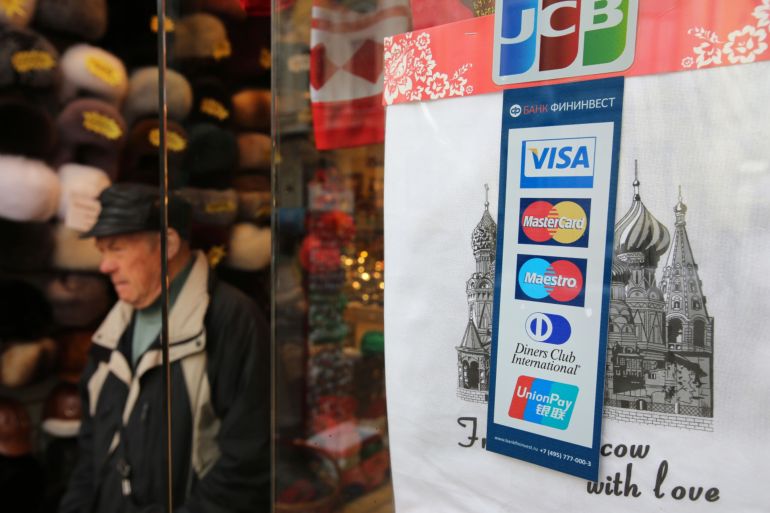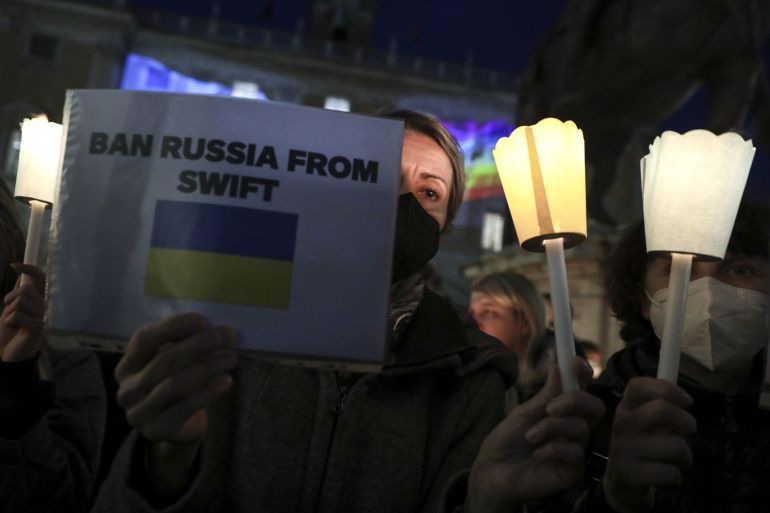China limits concerns on Ukraine to self-interest
While China will help Russia get around sanctions, it is more focused on problems closer to home.

New Delhi, India–Nearly a month into the Russian invasion of Ukraine, the Chinese appear barely interested in the crisis. While the world has noticed Beijing’s absence from the negotiating table, that, experts say, is in line with Chinese thinking which is more concerned with issues closer to home.
“They don’t want to get into this,” Amit Gupta, an associate professor at the US Air Force’s Air War College at Montgomery, Alabama, told Al Jazeera. “The Chinese essentially told Joe Biden, ‘Look this is a European problem. You guys deal with it’.
Keep reading
list of 4 itemsUS, China discuss Russia as Biden and Xi hold call
What is China’s strategy on Ukraine?
Ukraine calls on China to condemn Russia’s invasion
“They are worried about Taiwan, South China Sea, East China Sea. These are the three things that upset them – the India-China border is the fourth. Russia and Ukraine, they’re not interested in,” says Gupta.
But this absence stands out, more so after the nearly 5,400-word joint statement during the visit of President Vladimir Putin for the Winter Olympics, celebrating “no limits” to their friendship, 20 days before the invasion.
“Friendship between the two States has no limits, there are no ‘forbidden’ areas of cooperation, strengthening of bilateral strategic cooperation is neither aimed against third countries nor affected by the changing international environment and circumstantial changes in third countries,” it read.
But while experts agree that the Chinese have different priorities, they also think Beijing may have known about the coming invasion.
“My sense is President Vladimir Putin certainly did inform President Xi Jinping that this was going to happen,” says Jabin Jacob, an associate professor at Shiv Nadar University on the outskirts of the Indian capital.
Gupta agrees that the Chinese “had been given an indication” by Putin that he was going to take action. The Chinese, he says, had realised that “Putin’s not going to back down on this. And the Chinese accept it, understand it. Will live with it,” he says.
‘Stand with the Russians’
While Chinese statements continue to be tortuously ambiguous, state-proxies have expressed zero-sum thinking in the last week that reasonably approximates the edgier positions of its leadership.
Can you help me fight your friend so that I can concentrate on fighting you later?
— CGTN LIU Xin 刘欣 (@LiuXininBeijing) March 19, 2022
This shifting rhetoric, says Jacob, is entirely tactical. “The Chinese are very clear they will stand with the Russians,” to ensure a “united bulwark” against the West.

Still, China would prefer an outcome that includes a sovereign Ukraine, according to Bonnie Glaser, Director of the German Marshall Fund’s Asia Program in Washington, DC. “China prefers a negotiated end to the conflict that results in a neutralised Ukraine that remains a sovereign entity, and greater security for Russia, a divided and weakened NATO, and reduced US credibility and influence,” she says.
Chinese officials have recently said NATO should have been dissolved after the fall of the Soviet Union.
“I think they would probably like the idea that NATO didn’t expand eastward,” adds Gupta.
Jacob says that anything the Russians consider acceptable would be acceptable to the Chinese, as well. “The Chinese cannot countenance a situation where the West declares itself victorious.”
For now, he thinks China will help Russia go around the sanctions imposed by the West, up to a point. “The Chinese have solid alternatives,” he says, including a very strong currency, an alternative to the SWIFT international payment system and the UnionPay credit card network.
China has a smaller banking network like SWIFT called CIPS (Cross-Border Interbank Payment System) while UnionPay is a prominent Chinese financial services network that offers card services similar to Visa and Mastercard, which have shut down international operations in Russia after the sanctions. There are plans for UnionPay to connect to Russia’s Mir card services network to allow transactions that Mastercard and Visa can no longer offer.
However, there are limits to these options, as no matter how hard China tries to decouple and insulate itself from the West, its currency will never be equal to the US dollar because it can never relinquish control of the Renminbi and allow it to become a fully convertible currency like the dollar, Jacob says.
‘Collective leadership’
Gupta says the Ukraine crisis “ends up rather nicely for the Chinese for one reason. The West is now preoccupied with Europe,” he points out, adding that the war “has given the Chinese more breathing room” in the Indo-Pacific region where both China and the US are competing for influence.
However, that may not be the whole picture. Jacob points out that while “Chinese analysts have started talking about the Americans being tied up in Europe for a while”, the reality is that since the US has chosen not to fight in Ukraine, he does not think they would “step away from China or the Indo-Pacific”.
But there may be one unexpected outcome of this geopolitical chess game. The Ukraine crisis has the potential to dilute President Xi Jinping’s continuing efforts to consolidate authority by weakening a system of “collective leadership” that had been put in place by former leader Deng Xiaoping to avoid a repeat of Mao Zedong’s one-man rule.
While President Xi is expected to be re-elected general secretary of the Chinese Communist Party during its 20th National Congress later this year, after the “resurgence of COVID-19” and “rumblings about the economy”, any possible effect of the Ukraine crisis will likely be reflected in the all-important composition of the Politburo’s Standing Committee, said Jacob.